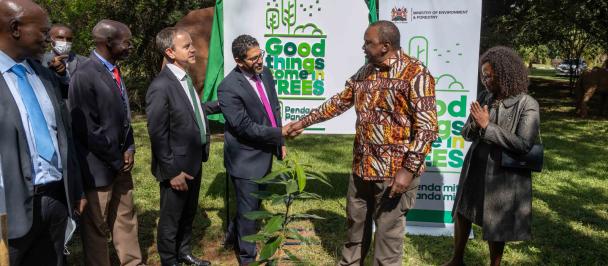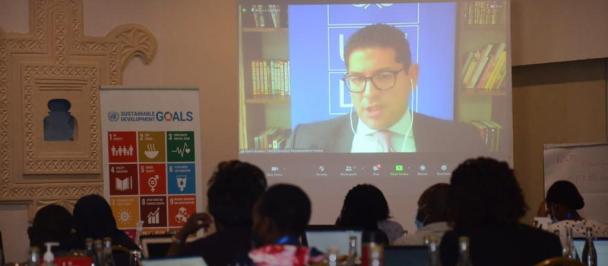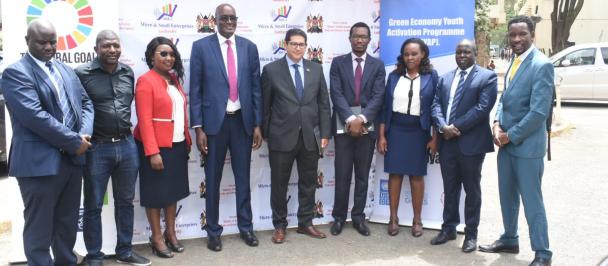RR Walid Badawi virtually delivered his remarks at the Local Conference Of Youth in Kenya
Good morning Irena Kenya Environment Action Network,
Thank you Dauphen for the trip down memory lane
I Appreciate the organizers of the meeting for inviting UNDP to provide remarks on the subject of “The role of youth and raising the climate ambition: UNDP’s climate promise” that has so far targeted over 118 countries globally including Kenya, supporting them to radically increase the ambition in their NDC’s to meet the rising global demand for climate action to reduce the ominous threat of continued human-induced a climate change.
I would also like to congratulate Kenya for raising its NDC ambition from 30-32% and acknowledge the participating youth for great enthusiasm and vibrant energy that they are displaying in demanding for greater ambition to meet the rising challenge of climate change in tandem with or commemoration of the International Day for Disaster Risk Reduction today.
With more than 1.8 billion young people in the world, of which 35.7 million live in Kenya (75.1%) are below 35 years, youth are critical stakeholders in climate action. However, they remain underrepresented in decision-making processes due to the lack of technical, political and financial support, discrimination related to age, gender, experience and capabilities as well as lack of access to information. These barriers continue to hamper youth meaningful engagement and influence on climate action and other development process.
A key success factor for raising climate ambition is to ensure youth-inclusive processes in climate negotiations and policy-making as well as implementation, monitoring and accountability.
It is urgent to act now for youth, and more importantly, with youth in the driving seat. Youth empowerment should be promoted both as a means and an end. Young people have the right to participate in public affairs, including on climate, environmental and development issues. Their knowledge, energy and perseverance have spurred a global movement demanding bold climate measures from their leaders, while also leading initiatives in their countries and communities.
Speaking of rights, on 8 Oct. in a landmark decision the UN Human Rights Council recognized for the first time that having a clean, healthy and sustainable environment is indeed a human right, in its resolution 48/13. The Council called on States to work together, and with other partners, to implement this newly recognized right. At the same time, through a second resolution (48/14), the Council also increased its focus on the human rights impacts of climate change by establishing a Special Rapporteur dedicated specifically to that issue. The issue will now pass on to the UN General Assembly for further consideration. Here let me applaud the efforts of young people who were instrumental in reaching this milestone.
We clearly recognize that to address the climate and COVID-19 crisis, inequalities, and exclusion gaps, we need to meaningfully engage with youth. All stakeholders must support youth capacity development, youth-led climate initiatives and create enabling environments for youth empowerment.
We need even more Kenyan youth to be mobilized to raise their voices and galvanize global action that will realize a better outcome in Glasgow, and specifically note the importance of youth voices in framing Kenya’s position on the key items that will be subject to global debate at the upcoming COP26.
I wish to refer to the ongoing technical negotiators preparatory meeting that is happening in Naivasha and challenge the youth’s to quickly prepare key messages that will be transmitted to the technical meeting, all the way to the PS, CS and even the President to ensure Kenyan youth voices are aptly captured in Kenya’s position at Glasgow.
UNDP believes in the importance of youth inclusion in development processes, and therefore encourages more youth to be actively engaged in activities that will help Kenya realize the ambitious emission reduction targets set in Kenya’s NDC Update 2020. The youth can effectively contribute to this through organizing and supporting innovations that would realize Kenya’s NDC Update targets of increased forestry cover, reduced emissions from the transport sector, improved adoption and use of climate smart technologies in the agricultural sector, blue economy, use of more renewable products to both rural and urban communities, sensitization and awareness creation to the community on disasters linked to changing climate and adoption of effective early warning systems that would reduce the vulnerabilities to local communities and even lead in innovating technological solutions that would strengthen Kenya’s climate action plans.
I therefore emphasize that the opportunities for Kenyan youth to provide leadership and catalyze an even greener future, even as the country seeks to bounce back from the Covid 19 pandemic are limitless and can only be hindered by lack of focus, ambition and innovation, traits that do not exist in the Kenyan youth that you have had the pleasure of interacting with to date.
UNDP has a good working relationship with Kenyan youth, that culminated in the establishment of a multi-stakeholder Youth Sounding Board - a useful platform for co-creating youth friendly projects and solutions infused within UNDP’s Country Programme Document that covers areas of governance and inclusive growth, environment, climate change and resilience. Notably we have CAS Nadia’s who is the Co-Chair of the UNDP Youth Sounding Board, as well as the National Youth Council CEO Mr. Roy Sasaka Telewa, who are integral members of the YSB, together with other representatives from civil society, private sector, and community-based organization and the UN.
UNDP’s Accelerator Lab, is an innovative vehicle that UNDP uses to find new approaches of addressing development challenges and is on offer to support this process.
Alongside many other projects and programmes, UNDP Kenya is implementing the GrEYAP project, which is focused on the green economy and digital disruption and places high premium on youth inclusion. The UNDP REDD+ Readiness Project consultation with Youth engaged in forestry-related projects from across the country in October 2020, revealed the centrality of agro-forestry not only to ecosystems restoration and reduction of carbon emission, but also in creating green jobs and sustainable livelihoods. It is from this meeting with the 70 young entrepreneurs in Voi, that UNDP in Kenya designed GrEYAP Project. GrEYAP seeks to unlock new livelihood and entrepreneurship opportunities within the green economy that includes forestry and agro-forestry value chains, as well as integrating innovative digitalization schemes for green businesses and entrepreneurship.
The GrEYAP project efforts in enhancing the agency and capability of youth and supporting the implementation of county government of Tana River’s climate-sensitive development planning approach, called “Model Urban Cluster Villages”, particularly by leveraging on innovation. Despite agriculture being the mainstay of Kenya’s economy accounting for 26% of Kenya’s GDP, and employing 63% of the national labour force, youth engagement in the sector is limited.
UNDP’s key focus for the upcoming COP26 shall include 4 key flagship engagements for COP26 that demonstrate that the multilateral approach to climate action with the Paris Agreement is working, and to showcase developing country leadership. More specifically,UNDP’s flagship high-level event at COP26 – “Ambition from the frontlines: Recognizing champions with the Climate Promise” –will show that many countries have stepped up to increase ambition and link to the SDGs.
The event, held in partnership with UNFCCC, UNEP and Executive Office of the Secretary-General, will take place on 3 November. It will be 1-hour long, fully virtual, fast-paced and contain pre-recorded and live elements. Link will be shared with all of you prior to COP26 and through the UNFCCC official programme.
I would also like to notably mention the launch of the 2021 NDC Outlook Report, that will share trends from the Climate Promise – the countries that are stepping up on climate ambition and how they are doing it, the role of inclusivity, and how NDCs are affecting development trajectories. The goal is to give a holistic perspective on climate action on the ground. This report is scheduled to be released on 28 October.
As I Conclude I encourage the youth to participate in the “Dear World Leaders” segment that seeks to take citizen voices to world leaders and decisionmakers at COP26. UNDP is asking the youth to prepare short messages on “what they would like to tell world leaders about the climate crisis?” and “how is climate change affecting you right now?” We have already received videos from a diverse array of people – from teenagers to a person that is 91 years old. We will show the results at COP26. We encourage everyone – including you and your families – to participate. The platform is live now.

 Locations
Locations


